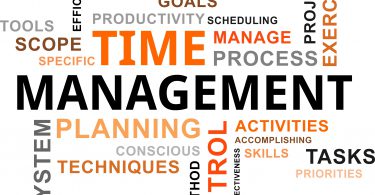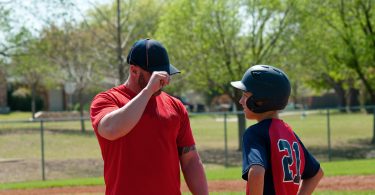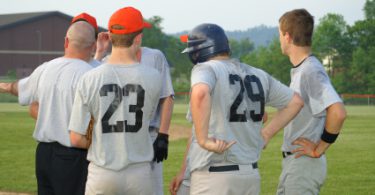In an old interview, legendary baseball coach, Jerry Weinstein, commented on the differing developmental timelines of baseball players, noting: “Not all the fruit on the tree gets ripe at the same time.”
This analogy is spot-on and incredibly important for young ballplayers to understand. The comparison is particularly meaningful as it relates to the timing of different events during the college baseball recruiting process. Because everyone’s recruiting and player development progresses or ‘ripens’ at different times, everyone will have a slightly different path to college baseball. While it would be nice to say, “Start contacting coaches on X day of X year,” to say so would be misleading. There is no one-size-fits-all answer to the right timing for contacting college coaches. With many different personal variables at play, the best time to contact coaches is different for everyone, but there is a way to tell when the timing is right for you.
In this article, we explain how to use your developmental timeline to answer the question every serious college baseball prospect wants to know: When is the best time to start contacting college coaches? Follow along below to figure out the best time for you!
Why Contact College Coaches?
When you contact college coaches in the recruiting process, you are doing more than signaling to them that you are interested in their program. What you are really doing is asking them to evaluate you as a candidate for their program. Coaches do not have time to be pen pals, so the next logical step for them when contacted by a new recruit is to decide whether the recruit is worth more of their time. Many recruits will eliminate themselves quickly with poorly written emails, questionable social media accounts, poor grades, or simply because they are contacting the school at an inappropriate time. For those that pass this preliminary step, the next step for the program is to evaluate your academic and baseball skills to see if they meet the standard for their expectations. Unless you are ready to put your best foot forward and be evaluated as a player, you should not contact college coaches to seek exposure.
The Importance of Proper Timing
As we have mentioned before, timing is everything in the recruiting process. When it comes to contacting college coaches, the timing is especially important and has to be right for you and the coach. For you, this means that you are physically, athletically, and academically ready for exposure. For coaches, this means their program is ready to recruit players in your graduating class. Usually, the higher the level of play, the earlier that program will be looking for recruits. For a top D1 prospect, this could come as early as freshman year. For most mid-major D1, D2 and D3 programs, the bulk of the recruiting takes place in the upperclassmen ( junior and senior) years. If you contact programs before your skillset is ready, you run the risk of being ignored, or worse yet, crossed off of their recruiting list permanently. For this reason, rather than force exposure and evaluation early, it makes sense to wait and strike while the iron is hot. In other words, be patient and contact coaches when you have what they may want, during the time they are looking for it.
The Benefits of Waiting
If you are on a path of improvement and becoming a better baseball player as you mature, there are few benefits to creating exposure or committing before the upperclassmen years, rather than letting your options develop. For starters, you can no longer take coach-lead campus visits until September 1 of junior year, making it difficult to get a complete picture of a program. or As we have written, verbal commitments also don’t guarantee anything and give all leverage to the college coach. Recruits who want to get things over with early often have a false sense of security after committing. Over-recruiting is prevalent at some levels of college baseball and coaches won’t hesitate to pull offers if they don’t like the way a commit is improving. NCAA Research reports that recruits who commit earlier are more likely to have the commitment fall through and generally have a less positive experience with the recruiting process. Unless you find your perfect fit, patience often pays off in recruitment and we explain why at length here. In short, if you are receiving interest and attention from college coaches early, it’s a good indication that you are ready to engage and contact other programs of interest at the same level if you are ready and interested in doing so. Use this as an opportunity to explore different options and get to know coaches, but understand that there is no rush to a final decision and the more interest you have, the more you control the pace of recruitment and final decision.
How to Know When it’s Time for You to Contact Coaches
There are 3 main mistakes recruits make when contacting college coaches:
- They initiate contact too soon in the recruiting process, before they have developed the skill set that coaches are looking for
- They contact coaches at the right time, but target an inappropriate level of play for their skill set (overvalue their skill set)
- They write an email that is never read (impersonal, poorly written, no attention to detail, addressed to the wrong person, etc.) or don’t get past the preliminary background check (grades/test scores aren’t good enough, bad social media presence, negative evaluation of video, etc.)
Here are 4 ways to avoid these common pitfalls and know when it’s time for you to contact coaches:
- You receive interest from a program at your desired level of college competition
If you receive genuine interest from a school at a certain level, it is a safe bet that schools of equal or lesser competition level may also be interested in you as well. Once you check to make sure the interest is genuine, you should feel comfortable contacting other schools at or below that level. For help determining if interest is genuine, use this KPB resource or communicate with the coach directly.
- When your skills match the standard for the level you wish to play
If you or someone who knows the different levels of college baseball well (your coach, a scout, etc.) can objectively say that your skill set or athleticism is on par with players at your desired level of NCAA competition, you can start reaching out to coaches at or below that level. It’s important that this honest and objective evaluation is accurate. If you contact schools before you have demonstrated the appropriate tool kit, or are not objective and honest in evaluating your skill level, you do so at your own expense. Coaches will ignore emails or worse, write you off as not good enough.
- When you know the exact school or have several schools that really fit your criteria and you can sell how you are an academic and baseball fit
If you know the exact school or have several schools that you would want to attend and can objectively say you meet the level of play and academic criteria for the school, it’s time to reach out and start creating a relationship with the coaches. Gauge interest levels, get to know them, develop an understanding of what they are looking for, and get to work showing them you can be the student-athlete they want. This strategy works especially well for niche or high academic schools with very specific admissions requirements.
- If you reach the summer before senior year and have not met criteria 1-3
If you get to the summer before your senior year and have yet to meet any of the first three criteria listed above, it’s time to contact coaches, create exposure, and go for it. Many college bound players develop late, and prospects still get interest and offers as late as the summer after graduation. If you’ve reached your last year of high school without any interest, you have nothing to lose. Target schools of the appropriate level and put your best foot forward.
Additional Resources on Contacting Coaches
For additional resources on contacting coaches and seeking exposure, consult our Contacting Coaches The Right Way and Seeking Exposure at the Right Time. After reading up, take the time to write a well-written, personalized email at the appropriate time to ensure you give it the best chance of being read. Good luck!






